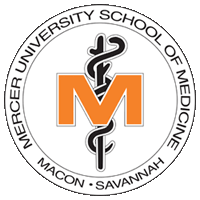Mercer University School of Medicine
 |
|
| Type | Private |
|---|---|
| Established | 1982 |
| Dean | William F. Bina III, M.D., M.P.H. |
| Students | 387 (MD Students) |
| Location |
Macon, Georgia Savannah, Georgia, USA |
| Website | http://medicine.mercer.edu |
Mercer University School of Medicine (MUSM) is the graduate medical school of Mercer University and a component of the Mercer University Health Sciences Center. It was founded in 1982 in Macon, Georgia, United States, and in 2008 opened a second campus in Savannah, Georgia with either site allowing students to complete all four requisite years of medical training. In 2012 MUSM developed a third site in Columbus, Georgia at which students may elect to complete their third and fourth years of training.
MUSM adopts a mission that is heavily directed towards training future physicians to practice in the state of Georgia, and as such, prospective matriculants must be Georgia residents. MUSM has teaching hospital affiliations with two of the five Level I trauma centers in Georgia, the Medical Center of Central Georgia in Macon, the second largest hospital in the state, and Memorial University Health Medical Center in Savannah, the largest hospital in eastern Georgia and southern South Carolina.
In addition to the Doctor of Medicine degree offered by MUSM, a number of other degree programs are available through this institution:
Since its foundation in 1982, Mercer University School of Medicine has adopted a discussion based pre-clinical curriculum in lieu of the more traditional lecture format. This Problem-Based Learning (PBL) approach to training students in the basic medical sciences focuses around small group discussions wherein students share didactic responsibilities and interact much more actively than in a standard lecture. In this system, each PBL group meets several times a week to review relevant literature and discuss issues pertinent to the current subject matter, and although each group contains a tutor (a professor of MUSM), there is no truly identified roles of teacher and student—instead, these roles are shared by every member of the group. Also in contrast to lecture-based programs, which generally necessitate subject exams, the PBL program makes use of multidisciplinary exams more similar in scope of content (i.e. multiple disciplines) to the USMLE board examinations.
...
Wikipedia
